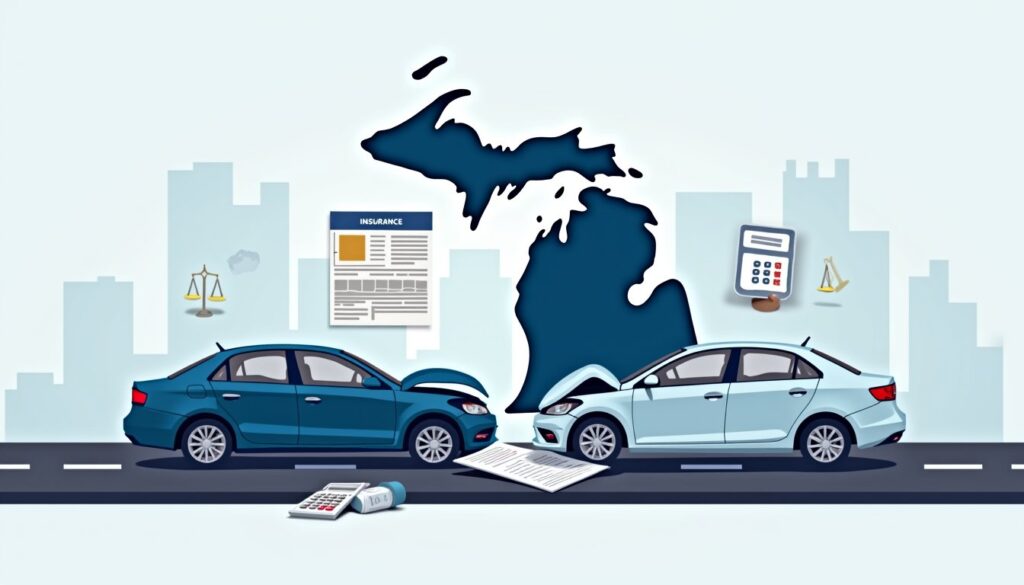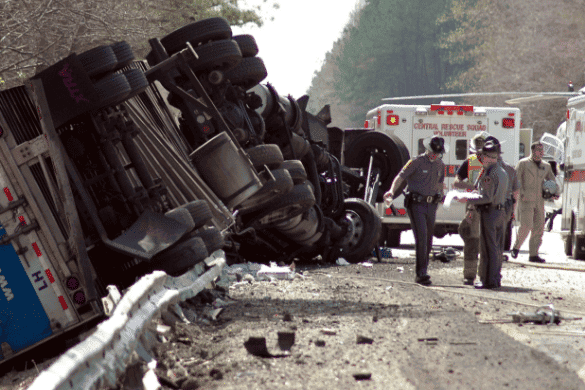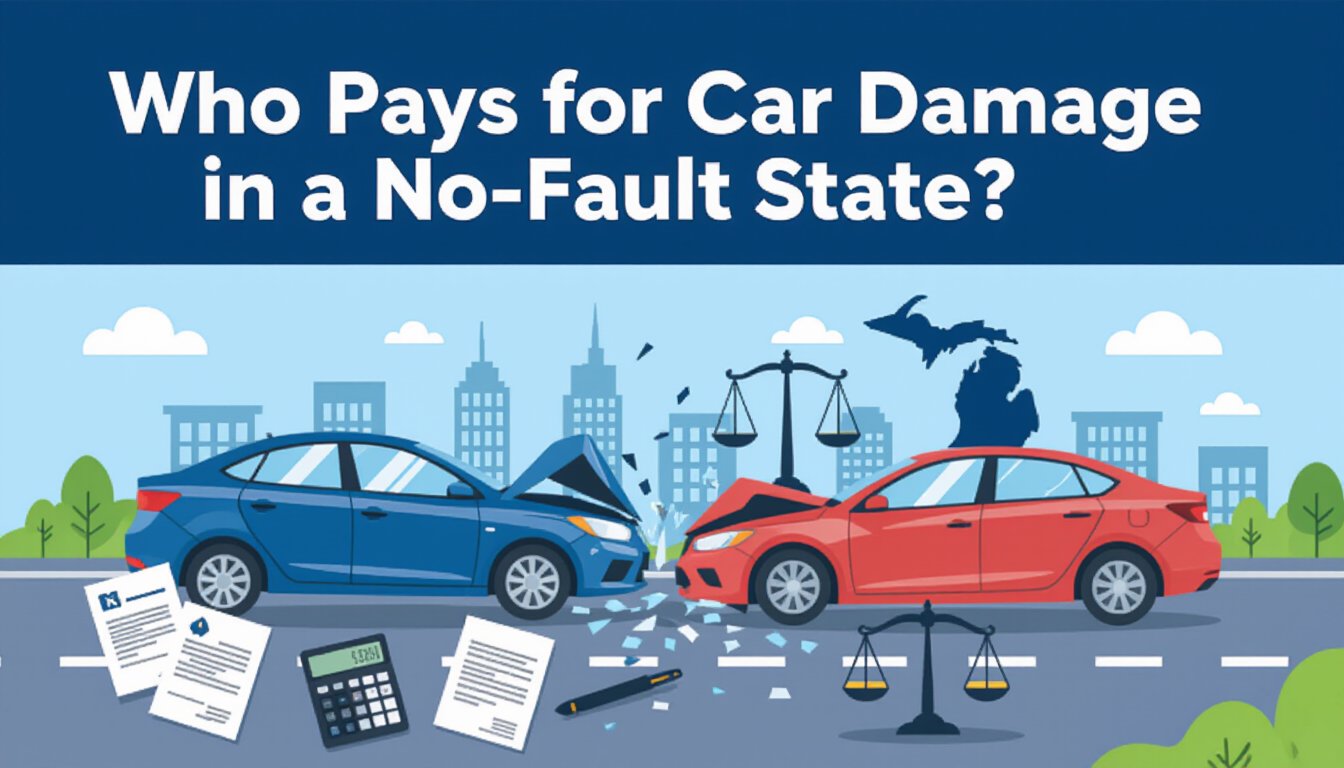If you’ve been in a car accident in Michigan, you’re probably asking one crucial question: “Who pays for car damage in a no-fault state?” The answer isn’t as straightforward as you might think. Michigan’s no-fault insurance system has unique rules that determine who pays for what, and understanding these rules can save you thousands of dollars and significant frustration.
At The Joseph Dedvukaj Firm, P.C., we help Michigan drivers navigate the complexities of no-fault insurance claims every day. Here’s everything you need to know about who pays for car damage in Michigan’s no-fault system.
Understanding Michigan’s No-Fault Insurance System
Michigan operates under a no-fault insurance system, which means that regardless of who caused the accident, each driver’s own insurance company typically pays for certain damages. However, this doesn’t mean fault doesn’t matter at all—especially when it comes to property damage and certain types of claims.
The Basics of No-Fault Coverage
Under Michigan’s no-fault system, your own insurance company pays for:
- Personal Injury Protection (PIP) benefits for medical expenses, wage loss, and attendant care
- Property damage to your own vehicle (if you have collision coverage)
- Mini-tort claims for property damage under certain circumstances
Who Pays for Vehicle Damage in Michigan?

The question of who pays for car damage in a no-fault state like Michigan depends on several factors:
1. If You Have Collision Coverage
If you carry collision coverage on your policy, your own insurance company will pay for repairs to your vehicle, regardless of who caused the accident. You’ll be responsible for paying your collision deductible, but there are ways to recover this cost.
2. If You Don’t Have Collision Coverage
Without collision coverage, you’ll need to pursue the at-fault driver’s property damage liability insurance to pay for your vehicle repairs. This can be more complicated and time-consuming than filing with your own insurance.
3. Mini-Tort Claims in Michigan
Michigan’s mini-tort provision allows you to recover up to $3,000 from the at-fault driver for:
- Your collision deductible
- Excess damage not covered by your collision coverage
- Vehicle damage if you don’t have collision coverage
This is one of the few areas where fault matters in Michigan’s no-fault system.
Common Scenarios: Who Pays What?
Let’s break down some common accident scenarios to understand who pays for car damage in a no-fault state:
Scenario 1: You’re Not at Fault and Have Full Coverage
What happens:
- Your insurance pays for vehicle repairs under collision coverage
- You pay your deductible upfront
- You can file a mini-tort claim against the at-fault driver to recover your deductible
- Your insurance may also pursue subrogation against the at-fault driver
Scenario 2: You’re Not at Fault and Have Liability Only
What happens:
- You must file a claim with the at-fault driver’s insurance company
- The at-fault driver’s property damage liability coverage should pay for your repairs
- If they don’t have insurance or insufficient coverage, you may need to pursue other options
Scenario 3: You’re at Fault
What happens:
- Your collision coverage pays for your own vehicle damage
- You’re responsible for your deductible
- The other driver can file a mini-tort claim against you for their deductible and damages up to $3,000
Scenario 4: Both Drivers Share Fault
What happens:
- Each driver’s collision coverage pays for their own vehicle damage
- Mini-tort claims may still be possible depending on the degree of fault
- An experienced attorney can help determine the best course of action
When the At-Fault Driver Doesn’t Have Insurance

Unfortunately, not all Michigan drivers carry adequate insurance coverage. If the at-fault driver was not issued a ticket or lacks proper insurance, you may face additional challenges in getting your vehicle damage covered.
Your options include:
- Uninsured motorist coverage (if you have it)
- Collision coverage through your own policy
- Legal action against the uninsured driver
- Michigan Assigned Claims Plan for certain situations
Exceptions to Michigan’s No-Fault Rules
While Michigan is a no-fault state, there are important exceptions where you can pursue the at-fault driver directly:
Serious Impairment Threshold
If your injuries meet Michigan’s “serious impairment of body function” threshold, you may be able to file a lawsuit against the at-fault driver for pain and suffering damages.
Property Damage Claims
Property damage claims are generally handled outside the no-fault system, meaning fault does matter for vehicle damage recovery.
Mini-Tort Claims
As mentioned, mini-tort claims allow limited recovery from at-fault drivers regardless of the no-fault system.
Maximizing Your Recovery After a Car Accident
Understanding who pays for car damage in a no-fault state is just the beginning. Here are strategies to maximize your recovery:
Document Everything
- Take photos of all vehicle damage
- Get a police report
- Collect witness information
- Keep all repair estimates and receipts
Understand Your Coverage
Review your insurance policy to understand:
- Your collision deductible amount
- Whether you have uninsured motorist coverage
- Your property damage liability limits
- Any additional coverage options
Consider Legal Representation
Insurance companies don’t always make fair settlement offers. An experienced Michigan car accident attorney can:
- Review your policy and determine all available coverage
- Handle mini-tort claims to recover your deductible
- Negotiate with insurance companies on your behalf
- Pursue additional compensation if you qualify under the serious impairment threshold
Special Situations in Michigan No-Fault Claims
Multiple Vehicle Accidents
In pile-up accidents or multi-vehicle crashes, determining fault and coverage can become extremely complex. Each driver’s insurance may be involved, and mini-tort claims may be available against multiple parties.
Government Vehicle Accidents
If you’re involved in an accident with a government vehicle, special rules and notice requirements may apply. The process for recovering vehicle damage can be more complicated than typical accident claims.
Commercial Vehicle Accidents
Accidents involving commercial trucks or delivery vehicles often involve higher insurance coverage limits and more complex liability issues. While Michigan’s no-fault rules still apply, the potential for additional recovery may be greater. Learn more about trucking accident cases and your rights.
Common Misconceptions About No-Fault Insurance

“No-Fault Means No One Pays”
This is false. In Michigan’s no-fault system, insurance companies still pay for damages—the question is which insurance company pays and for what.
“I Can’t Sue Anyone if I’m in a No-Fault State”
While no-fault limits some lawsuits, you can still pursue legal action for:
- Property damage claims
- Mini-tort recovery
- Pain and suffering (if you meet the serious impairment threshold)
- Excess PIP benefits in certain situations
“My Insurance Rates Won’t Go Up if It Wasn’t My Fault”
Unfortunately, filing any claim—even for accidents that weren’t your fault—can potentially affect your insurance rates, depending on your carrier and policy. Understanding how insurance companies handle claims is important for protecting your interests.
When You Need Legal Help
You should consider consulting with an experienced Michigan car accident attorney if:
- The insurance company denies your claim
- Your vehicle damage exceeds your coverage limits
- The at-fault driver is uninsured or underinsured
- You’re having trouble recovering your deductible through mini-tort
- You suffered injuries that may meet the serious impairment threshold
- Multiple parties are involved in the accident
For guidance on what to do after a car accident, it’s important to act quickly and understand your rights.
Steps to Take After a Car Accident in Michigan
- Ensure Safety: Move to safety and call 911 if anyone is injured
- Document the Scene: Take photos and gather information
- File a Police Report: This is crucial for insurance claims and mini-tort recovery
- Contact Your Insurance: Report the accident promptly
- Seek Medical Attention: Even if you feel fine initially
- Keep Detailed Records: Save all paperwork, receipts, and correspondence
- Consult an Attorney: Especially for significant damage or injuries
Understanding Your Insurance Policy
Many Michigan drivers don’t fully understand their insurance coverage until they need it. Key coverage types include:
Personal Injury Protection (PIP)
- Covers medical expenses, wage loss, and attendant care
- Required in Michigan (though coverage amounts can vary)
Property Protection Insurance (PPI)
- Covers damage you cause to other people’s property
- Required in Michigan with $1 million minimum coverage
Collision Coverage
- Covers damage to your own vehicle
- Optional but highly recommended
Comprehensive Coverage
- Covers non-collision damage (theft, vandalism, weather)
- Optional coverage
The Cost of Being Uninsured in Michigan
If you’re caught driving without insurance in Michigan, you face:
- Fines up to $500
- Driver’s license suspension
- Vehicle registration suspension
- Personal liability for all damages you cause
More importantly, if you’re uninsured and cause an accident, you’ll be personally responsible for all property damage and injuries—which can easily reach tens or hundreds of thousands of dollars.
How Attorney Representation Can Help

At The Joseph Dedvukaj Firm, P.C., we help Michigan drivers understand who pays for car damage in a no-fault state and ensure they receive fair compensation. Our Michigan auto accident attorneys provide services including:
- Policy Review: We examine your insurance coverage to identify all available benefits
- Claim Management: We handle communications with insurance companies
- Mini-Tort Claims: We pursue recovery of your deductible and other property damage
- Serious Impairment Cases: We evaluate whether your injuries qualify for additional compensation
- Litigation: If necessary, we take cases to court to ensure fair recovery
Conclusion: Protecting Your Rights in Michigan’s No-Fault System
Understanding who pays for car damage in a no-fault state like Michigan is crucial for every driver. While the no-fault system provides certain protections, it’s also complex and insurance companies don’t always explain all your options.
The key takeaways are:
- Your own collision coverage typically pays for your vehicle damage first
- You can often recover your deductible through mini-tort claims
- Fault still matters for property damage claims
- Having proper insurance coverage is essential
- Legal representation can help maximize your recovery
If you’ve been in a car accident in Michigan and have questions about who pays for your vehicle damage, don’t navigate the complex insurance system alone. The experienced attorneys at The Joseph Dedvukaj Firm, P.C. can help you understand your rights and ensure you receive fair compensation.
Call us 24/7 at 866-HIRE-JOE or visit www.1866HIREJOE.com for a free consultation.
Don’t let insurance companies take advantage of your situation. We’ll fight to ensure you receive every dollar you’re entitled to under Michigan’s no-fault insurance system.


